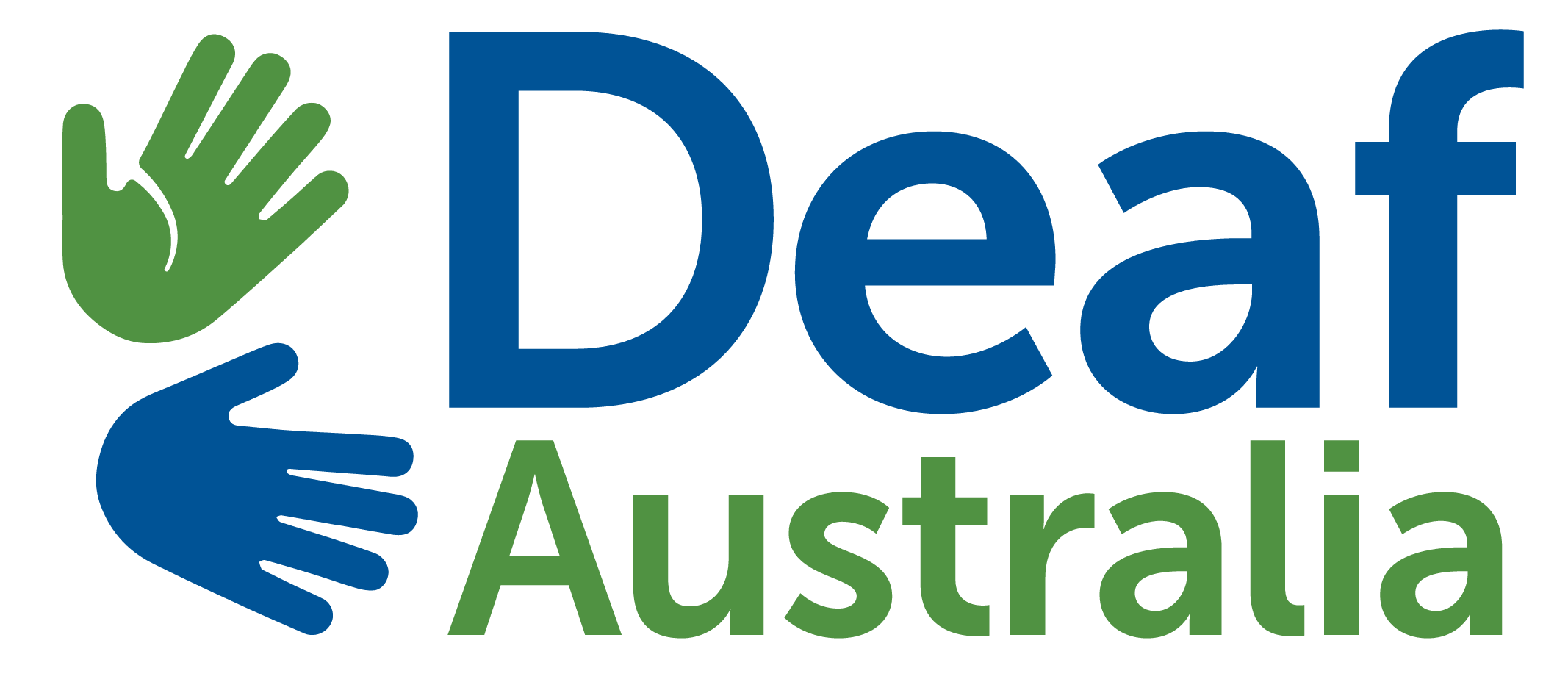No products in the cart.
Deaf Australia in 2017
Deaf Australia wish to share with you our ‘end of year’ report with highlights.
Most of you may be aware that Deaf Australia has been operating at a very minimal capacity in the last couple of years. Much of the time in 2017 has been focusing on reviewing the organisation’s capacity and to undertake strategies that will strengthen Deaf Australia in 2018 and beyond.
The National Disability Insurance Scheme (NDIS) has contributed many challenges and opportunities across the disability sector and for Deaf Australia to position itself as a prominent voice of the deaf community. We have participated in many meetings with the NDIS and wrote a submission to the NDIS’s Productivity Commission on NDIS Costings – highlighting many discrepancies with interpreting costing (e.g. travel, qualifications) and need to access Auslan for family with newly diagnosed child who are deaf.
NDIS’s Information, Linkage and Capacity (ILC) has offered plenty of opportunities for Deaf Australia and others to undertake capacity building activities throughout the year. We have conducted a Member Survey 2017 through cooperation with Australian Federation of Disability Organisations to find out what members thinks and wants from Deaf Australia in going forward. The results were not surprising for Deaf Australia and strengthen our resolves to explore in how we can better meet deaf and hard of hearing people’s needs.
The National Disability Strategy (2010-20) has also been reviewed by the Commonwealth Government. Deaf Australia has written a comprehensive submission to the Government and attended to a public hearing with the Commonwealth’s Parliament. Deaf Australia believed that the National Disability Strategy has poor delivery record for deaf and hard of hearing people due to lack of effective policy changes and strategies from the government. A final report has been released and it contained 17 references from Deaf Australia.
One of the key recommendations from Deaf Australia is that Auslan to be legally recognised as a language for Deaf people to use it.
Deaf Australia also put in a comprehensive written submission into Hearing Health and Wellbeing advising the Parliamentary Committee that access to Auslan must be achieved for every deaf/ hard of hearing person so that their wellbeing can be improved. We also attended to public hearing with the Parliamentary Committee.
Auslan curriculum for primary and secondary schools are now being provided in several schools throughout Australia as Language other than English (LOTE) program. Deaf Australia is proud to see this program being implemented after many years of advocating the Commonwealth Government to develop this curriculum.
Auslan Training Package for TAFE has also been reviewed this year. The Australian Industry and Skills Committee has recently approved the training package which will be taught under Public Sector stream. It is with disappointment that the Committee have rejected that the Auslan Assessors must be deaf and to have Auslan as the primary language. We will continue promote that Auslan Assessors must be deaf.
The National Relay Service (NRS) is currently being under review for new funding contract from 1 July 2018. It is not clear what Commonwealth Government is planning for the NRS but we believe that the NRS will continue but is uncertain whether or not if there will be improved access to Video Relay Service (VRS) nor if there will be additional fund to ensure NRS operates at full capacity.
Deaf Australia has attended to a number of reference groups to ensure that deaf and hard of hearing people can access range of support and services. Australian Electoral Commission, Australian Banking Associations, National Relay Service, National Disability Insurance Agency, Australian Subscription Television and Radio Association, and more.
All the activities are about ensuring that deaf and hard of hearing Australians are equal members of the Australian society, which reflect our vision – making an Inclusive Australia for deaf people.
Deaf Australia has our 31st Annual General Meeting on 28 October in Sydney. It was a small meeting; however, a quorum was sufficient for the AGM to proceed as usual. Western Australian Association of the Deaf proposed that Deaf Australia to develop an Accessible Social Media Policy which we will undertake and propose to Members at the next AGM to be held in Canberra ACT.
Deaf Australia Board
- Todd Wright (NSW) – Chairperson/ Treasurer
- Debbie Kennewell (SA)
- Adrian Doyle (Vic)
The board plays a vital role in ensuring that our focus and activities are aligning to the member’s wishes and aspirations. We work closely with Deaf Youth Australia (DYA) to support deaf youth activities and they successfully hosted the World Federation of the Deaf’s Youth Junior Camp in Phillip Island. Deaf Australia commends DYA on their outstanding work.
Deaf Youth Australia Board
- Shirley Liu (Vic) – President
- Vanessa Alford (WA) – Treasurer
- Annabel Beasley (Vic) – Secretary
- Tahlia Barry (Vic)
- Joshua Doe (NSW)
It is with sadness that our longest serving board member of Deaf Australia (formerly known as Australian Association of the Deaf) has passed away so suddenly. Mrs Ann Darwin has served Deaf Australia for 21 years and was awarded an Honorary Life Membership in 2006 for dedication to Deaf Australia over the years. Our thoughts are with Mr Barry Darwin and his family.
Going into 2018, Deaf Australia are now able to represent the community in a formal capacity after regaining the funding we have lost in 2014. We are currently waiting for more details of the fund; however, we will continue seek for opportunities for Deaf Australia to represent deaf and hard of hearing people throughout Australia.
Deaf Australia wish to express appreciation and thanks to individuals and organisations in working together to address challenges and issues. We look forward in continuing this relationship in 2018.
As 2017 is closing, we thank you for your ongoing support It is important that your issues are being heard and we work with you to make sure that issues can be resolved for you and other deaf Australians. We look forward in continuing working with you in 2018 and beyond.
Have a Happy Holidays and a safe New Year.
Kyle Miers
CEO – Deaf Australia
**Media Release** International Day of Sign Language formally adopted by UN and announcement of National Week of Deaf People 2018
Deaf Australia wishes to congratulate the United Nations in adopting the resolution for the International Day of Sign Languages today at the 72nd United Nations General Assembly.
International Day of Sign Languages will be held on 23 September annually.
The World Federation of the Deaf, which Deaf Australia is a National Member, have sought support from Antigua and Barbuda who proposed this resolution. The resolution was co-sponsored by 97 United Nations Members States (including Australia) and adopted by consensus.
Why International Day of Sign Languages?
The aim of International Day of Sign Languages is to raise greater awareness and recognition of sign languages, and that early access to sign language and services in sign language, including quality education, is vital to the growth and development of deaf individual and critical to the achievement of the internationally agreed development goals.
Why 23 September?
This is the date that commemorate the establishment of World Federation of the Deaf in 1951, which has as one of main goals, the preservation of sign languages and deaf culture as pre-requisites to the realisation of the human rights of deaf people.
What is Australia’s Sign Language?
The sign language of Australia is known as Auslan (Australian Sign Language). Auslan has been recognised by the Federal Government as a community language of Australia in 1991.
How can Australia be Involved?
The National Week of Deaf People (NWDP) is hosted by Deaf Australia and provides many organisations, schools and others the opportunity to raise awareness of deaf people and Auslan. Traditionally, we host this event during October, however in recognition of the establishment of the International Day of Sign Languages, the NWDP will be moved to coincide with the International Day of Sign Languages.
When is the next National Week of Deaf People?
National Week of Deaf People will be on 23 – 29 September 2018. In the following years Deaf Australia hopes to align the National Week of Deaf People with the International Week of Deaf hosted by the World Federation of the Deaf, traditionally held during the last week of September.
What activity can be held during the National Week of Deaf People?
State organisations and other community organisations, clubs, schools and others host a wide range of activities through the week including workshops and lessons where people can learn Auslan, other workshops and presentations about deaf people and their community, community festivals, fundraising activities, and many more.
To find out more about these activities, please check for registered activities on Deaf Australia’s website.
If an organisation wishes to provide activities through the week and to promote to the deaf community, you can register the event on Deaf Australia’s website.
Deaf Australia will be working with the government, business and organisations to help promote the National Week of Deaf People and the International Day of Sign Languages.
Please view here to see Auslan Translation of Media Release.
References:
United Nations’ Resolution: A/C.3/72/L.36/Rev.1
World Federation of the Deaf Press Release: Press Release
National Week of Deaf People: www.deafaustralia.org.au/NWDP
Sign On For Literacy Competition now open

All Children Reading: A Grand Challenge for Development (ACR GCD) launched the Sign On For Literacy on 8 November 2017 in Budapest, Hungary during the 3rd International Conference of the World Federation of the Deaf.
The Sign On For Literacy competition is organised by All Children Reading partnered with USAID, World Vision and the Australian Government, in collaboration with the WFD, Nyle DiMarco Foundation and Deaf Child Worldwide. This competition seeks technology-based innovations to increase access to sign languages and literacy interventions for deaf children. These innovations will assist parents, educators, communities, and governments in enhancing early childhood development outcomes, improving access to local sign languages, and increasing literacy outcomes of deaf children.
The competition criteria can be found on the All Children Reading website
The submission deadline is 16 February, 2018.


